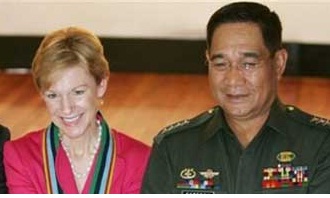
The latest I’ve read was then ambassador Kristie Kenney’s assessment of Hermogenes Ebdane, Jr. as the defense secretary written in March 2007. It was one insult after another.
It said, “Tongue-tied and reticent, Defense Secretary Hermogenes Ebdane stands in stark contrast to his articulate and sophisticated predecessor, Avelino “Nonong” Cruz. “
It continued: “Ebdane was far from the best choice President Arroyo could have made to succeed former Secretary Cruz. He is clearly no intellect, but a through-and-through loyalist, a quality that the president, who only a year ago faced down a coup attempt, treasures. “